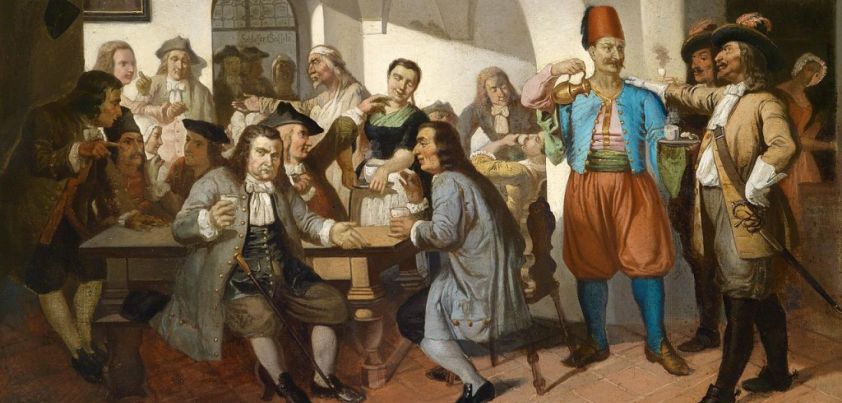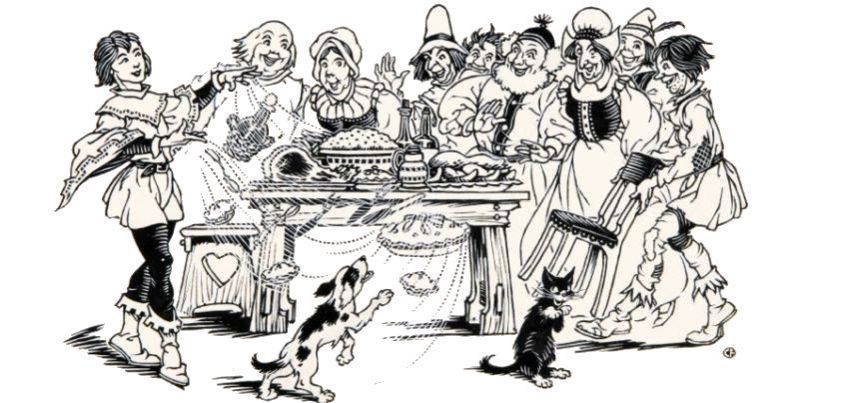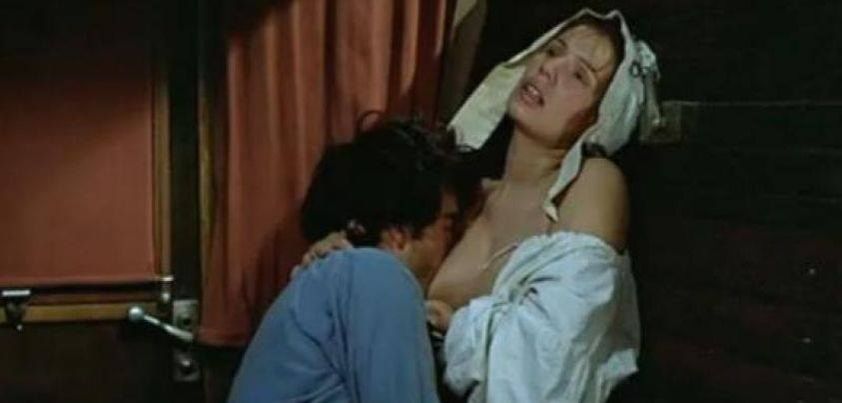 In this story from Leo Tolstoy, customers in an Indian coffeehouse overhear a disillusioned religious scholar questioning his servant about the existence of God. This sparks a debate about which religion is God’s favorite. Arguments are put forward supporting most of the mainstream European and Asian religions of the day, as well as some unusual ones like idolatry and fire-walking. The answer (that God is not exclusive to any one system of beliefs) is provided in an allegorical tale from a Confucian scholar about a debate over the existence and path of the sun. Themes: diversity, bigotry, intolerance, religious pluralism. More…
In this story from Leo Tolstoy, customers in an Indian coffeehouse overhear a disillusioned religious scholar questioning his servant about the existence of God. This sparks a debate about which religion is God’s favorite. Arguments are put forward supporting most of the mainstream European and Asian religions of the day, as well as some unusual ones like idolatry and fire-walking. The answer (that God is not exclusive to any one system of beliefs) is provided in an allegorical tale from a Confucian scholar about a debate over the existence and path of the sun. Themes: diversity, bigotry, intolerance, religious pluralism. More…
The Ass, the Table, and the Stick
 In this English folktale, a young man works for a year and earns a magic donkey. An innkeeper tricks him out of it, so he works for another year and earns a magic table. The same innkeeper tricks him out of this. For his next job, the boy earns a magic stick. This helps the young man get his donkey and table back, as well as to marry his true love. Unfortunately, in winning the girl the young man shows a side of his personality that will make readers wonder if he really deserved all the magical help! More…
In this English folktale, a young man works for a year and earns a magic donkey. An innkeeper tricks him out of it, so he works for another year and earns a magic table. The same innkeeper tricks him out of this. For his next job, the boy earns a magic stick. This helps the young man get his donkey and table back, as well as to marry his true love. Unfortunately, in winning the girl the young man shows a side of his personality that will make readers wonder if he really deserved all the magical help! More…
The Good Shopkeeper
 A major theme of this story by Samrat Upadhyay is pride. Other themes include progress, family, social status, escapism through infidelity, humility, self-sufficiency. Set in Nepal, an accountant in a struggling international company loses his prestigious job to a younger man with better computer skills. He is married with a seven-month-old baby, and seeks help from his shady but well-connected brother-in-law. When nothing comes up, he finds solace in an affair with a housemaid he meets in a park. Through the housemaid’s simplistic outlook and lifestyle, he learns that self-worth comes from within and not a fancy job or title. More…
A major theme of this story by Samrat Upadhyay is pride. Other themes include progress, family, social status, escapism through infidelity, humility, self-sufficiency. Set in Nepal, an accountant in a struggling international company loses his prestigious job to a younger man with better computer skills. He is married with a seven-month-old baby, and seeks help from his shady but well-connected brother-in-law. When nothing comes up, he finds solace in an affair with a housemaid he meets in a park. Through the housemaid’s simplistic outlook and lifestyle, he learns that self-worth comes from within and not a fancy job or title. More…
The Railroad and the Churchyard
 In this story by Bjørnstjerne Bjørnson two friends fall out over a proposal to sell the public grain magazine and establish a community savings bank. The decision (to sell the magazine) brings prosperity to all. Years later, as many in the parish face financial ruin due to speculation, the two clash again over a proposal to allow a new railway to pass through the town. Although the railway will increase land values, the only route possible includes part of an old, disused cemetery. This leads to a fiery ending. Themes include friendship, tradition vs. progress, conflicts of interest, desperation, community. More…
In this story by Bjørnstjerne Bjørnson two friends fall out over a proposal to sell the public grain magazine and establish a community savings bank. The decision (to sell the magazine) brings prosperity to all. Years later, as many in the parish face financial ruin due to speculation, the two clash again over a proposal to allow a new railway to pass through the town. Although the railway will increase land values, the only route possible includes part of an old, disused cemetery. This leads to a fiery ending. Themes include friendship, tradition vs. progress, conflicts of interest, desperation, community. More…
Idyll
 In this story by Guy de Maupassant, a man and woman share a compartment and become friends during a long train journey. The idyllic countryside is in contrast to the way the woman feels. She is a wet-nurse (a woman who cares for and breast-feeds other people’s babies) and is in great pain because she hasn’t had a baby to her breasts in over two days. The man offers to help and, in so doing, solves a problem of his own. Themes include connection, desire, social perceptions of human anatomy and function, defiance of social norms to satisfy a basic need. More…
In this story by Guy de Maupassant, a man and woman share a compartment and become friends during a long train journey. The idyllic countryside is in contrast to the way the woman feels. She is a wet-nurse (a woman who cares for and breast-feeds other people’s babies) and is in great pain because she hasn’t had a baby to her breasts in over two days. The man offers to help and, in so doing, solves a problem of his own. Themes include connection, desire, social perceptions of human anatomy and function, defiance of social norms to satisfy a basic need. More…